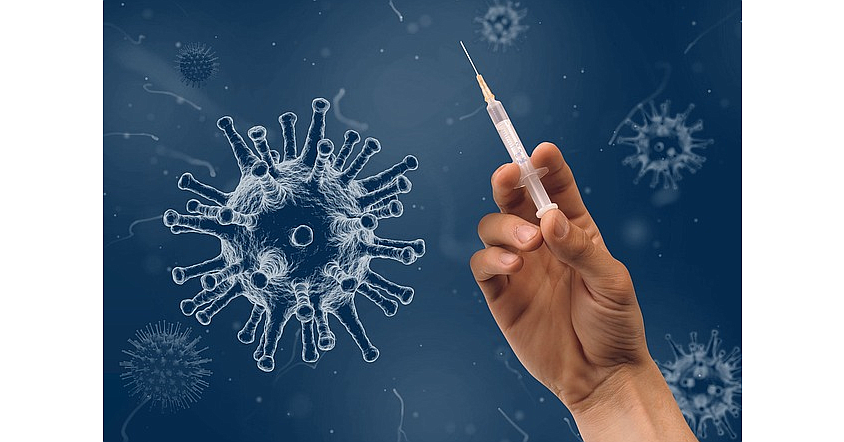This Month's COVID News Updates
March 25, 2023 at 5:15 p.m.
...by JOHN SCHIESZER
COVID-19 vaccinations may have special heart benefits. Analyzing the most extensive datasets in the United States, researchers from the Icahn School of Medicine at Mount Sinai has revealed that vaccination against COVID-19 is associated with fewer heart attacks, strokes, and other cardiovascular issues among people who were infected with SARS-CoV-2, the virus that causes COVID-19.
It is the first study to examine both full and partial vaccination and the link to major adverse cardiac events (MACE) in the United States, confirming similar analyses performed previously using a Korean COVID-19 registry.
Researchers used the National COVID Cohort Collaborative (N3C) database, the largest national comprehensive database on COVID-19. Since its inception in 2020, the N3C has continuously collected and harmonized data from electronic health records of institutions across the country. Included in this study were 1,934,294 patients, and 217,843 received mRNA vaccine formulations by Pfizer-BioNTech or Moderna or viral vector technology by Johnson & Johnson.
"We sought to clarify the impact of previous vaccination on cardiovascular events among people who develop COVID-19 and found that, particularly among those with comorbidities, such as previous MACE (major adverse cardiac events), type 2 diabetes, high cholesterol, liver disease, and obesity, there is an association with a lower risk of complications. While we cannot attribute causality, it is supportive evidence that vaccination may have beneficial effects on a variety of post-COVID-19 complications," said senior author Dr. Girish N. Nadkarni, who is a Professor of Medicine at Icahn Mount Sinai, New York, New York.
Further work will be necessary to elucidate the mechanisms involved from an immunological perspective and clarify the role of SARS-CoV-2 subtypes and reinfections in their relationship to the risk of MACE. "To our surprise, even partial vaccination was associated with lower risk of adverse cardiovascular events," said first study author Joy Jiang, an MD/PhD candidate in the lab of Dr. Nadkarni. "Given the magnitude of SARS-CoV-2 infection worldwide, we hope our findings could help improve vaccination rates, especially in individuals with coexisting conditions."
What Are the Benefits of Being Vaccinated?
Many older adults, who are at higher risk for complications from a COVID-19 infection, wonder just how protected they are after having completed all the recommended vaccinations. Now, researchers have created what they believe may be one of the first models for predicting who has the highest probability of being resistant to COVID-19 in spite of exposure to SARS-CoV-2.
The best means of staying healthy is to avoid infection by the SARS-CoV-2 virus. If, however, you do become infected, vaccination appears to limit the risk of developing severe or even fatal symptoms. This is because the currently available vaccine primes your immunological system for producing antibodies without causing you to get sick. If you do become infected, your body is prepared to fight the disease. Vaccination typically results in fewer or milder symptoms when you are ill or have no symptoms at all.
Protection for your family and friends is vital. By getting the COVID-19 vaccine, you can lower the chance of spreading the COVID-19 pathogen to family members, friends, or other people with whom you have contact. The current vaccines have very high rates of effectiveness. All FDA-approved medications are clinically tested before release to the public.
The Pfizer-BioNTech vaccine has been shown to be 94-95% effective within two weeks of full inoculation against the original strand of the COVID-19 virus. Vaccines also show high numbers of efficacy protecting people from serious illness from COVID-19 variants.
"If we can identify which people are naturally able to avoid infection by SARS-CoV-2, we may be able to learn, in addition to societal and behavioral factors, which genetic and environmental differences influence their defense against the virus," said lead study author Karen Yang, a biomedical engineering graduate student in the Translational Informatics Research and Innovation Lab at The Johns Hopkins University, Baltimore, Maryland. "That insight could lead to new preventive measures and more highly targeted treatments."
Machine-Learning May Be Highly Beneficial
A machine-learning model is a computer program or system that uses mathematical algorithms to find statistical patterns, and then apply the patterns moving forward. This gives such systems the ability to imitate human thinking and reasoning, and similar to the brain, learn over time.
"Using a machine-learning system to recognize complex patterns in large numbers of people with COVID-19 enabled another team of Johns Hopkins Medicine researchers in 2021 to predict the course of an individual patient's case and determine the likelihood that it would become severe," said study investigator Dr. Stuart Ray, who is vice chair of medicine for data integrity and analytics, and professor of medicine at the Johns Hopkins University School of Medicine. "Based on their success, our team wondered if the same approach also might be applied to predicting who could be exposed to SARS-CoV-2 in close quarters and still not get infected."
The study included 8,536 adults who reported exposure as their reason for getting COVID tested. They were divided into two groups: those who did not share a household with any COVID-19 patients or their residence had 10 or more patients; and those who shared a residence with 10 or fewer people, with at least one being a COVID-19 patient.
By looking at patient demographic information (age, sex and race), the International Statistical Classification of Diseases and Related Health Problems (ICD) medical diagnostic codes relevant to each case, outpatient medication orders and the number of comorbidities (other diseases) present, the researchers were able to better predict which individuals are more likely to have greater resistance to COVID-19.
Overall, the researchers identified 56 patterns of ICD codes that were associated with resistance or not associated resistance. The researchers now report that future trials using national patient data are needed to validate these findings.

John Schieszer is an award-winning national journalist and radio and podcast broadcaster of The Medical Minute. He can be reached at medicalminutes@gmail.com.





